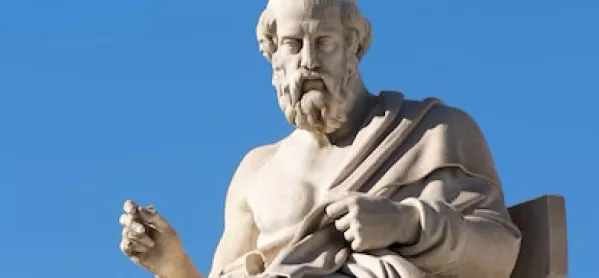When Plato met Damian Hinds...
Share
When Plato met Damian Hinds...
Plato: Secretary of state! Do you have a moment?
Damian Hinds: Plato, hello! What are you doing here? It’s 2pm on a Friday, shouldn’t you be in school?
P: Yes, but unfortunately, my school has cut its timetable due to funding issues, and Socrates, my teacher, has quit. Given the recruitment crisis, they’re having quite a lot of difficulty replacing him.
DH: Aah, well… what’s the problem? I am a very busy man.
P: Indeed, you are. And given your responsibility for our education system, a very important man, too! You’re our navigator, our captain. All aboard the great ship “The Golden Hinds”!
DH: Ha, very good, Plato. But it is true, the education system needs a leader.
P: It certainly does. And, given your speech last month, you seem to be just that person. How was it you described the school system you believed in? Freedom, diversity and accountability?
DH: Yep. That was it.
P: What an inspiring and lofty notion!
DH: Well that’s what we need, isn’t it? A “ship of state” needs to be guided by someone with high ideals, a stargazer who is guided by the heavens, so I’m sure you agree with the tack I’m taking.
P: I forgot that you were a philosophy scholar! As such, I wonder if you could explain something to me - in what sense do you think that freedom is important in the education system?
DH: Well it’s about autonomy, about giving good people the power to make their own decisions - within reason, of course. Freedom must be balanced by accountability.
P: Absolutely, no school should be free to fail children.
DH: Of course, children only have one chance at an education - they all deserve the best.
P: But a school should also be free to not fail children.
DH: Absolutely.
P: But if a school cannot do anything other than fail children, for example, because they don’t have enough money or teachers, then, even with ”little extras”, we couldn’t say they’re free, could we?
DH: Look, I am conscious of the budgeting challenges. But all schools have options. This is the vision behind multi-academy trusts; schools coming together to achieve more than they can on their own.
P: OK. But if schools become part of MATs, they lose their independence. So - and forgive me if I’ve got this wrong - a school that’s struggling to fund itself has the freedom to exchange that freedom in return for funding? Forgive me, Mr Secretary, but I’m not sure we can count the freedom to be enslaved as much of a freedom at all.
DH: That’s a shameful exaggeration, Plato! There’s a clear difference between slavery and losing one’s freedom because, for example, one cannot be trusted with it.
P: Of course, I apologise. If a school has, for example, been “gaming the system” as it were, then it would be quite right if its freedom to do so was taken away
DH: Yes.
P: Why do you think some schools wish to “game the system”?
DH: I’d assume, for example, they unfairly exclude or off-roll children because they want their school’s results to look better.
P: And who might be pressuring them to make their results to look better?
DH: Plato, you cannot blame the Department for Education for the misbehaviour of schools. Accountability measures are no excuse for unethical behaviour.
P: Absolutely. They’re not. Even if schools aren’t funded adequately, and even if performance measures are meaningless and unrealistic given that lack of funding and their context, that is no excuse for unethical behaviour.
DH: So, you think freedom would require doing away with accountability measures altogether? If we did such a thing, how could we ever ensure progress and create a world-class education system?
P: So those accountability measures are a map by which you, our captain, are leading us to our destination? Pray tell, where are we going?
DH: Look, no one knows what the future will be like, and that’s precisely why we need a focused and sustained plan for education based on evidence: how many students are on track to be fluent readers, the attainment gap between disadvantaged pupils and their peers. Such measures aren’t perfect, of course, but they build a picture.
P: No, indeed. There’s a similarity between the way we can learn from these measures, and how we can learn about an object from its shadows, wouldn’t you say?
DH: I suppose so.
P: But, and forgive my impudence, wouldn’t it be better if we were guided by something real?
DH: But these measures are real!
P: Well, that’s arguable. The DfE’s funding figures are very much a “shadow” of reality, no?
DH: I’m not discussing that, Plato.
P: … regardless, you’ve admitted that the other measures are imperfect. You espouse freedom, but is not someone who is chasing shadows less free than someone who is not?
DH: Arguably, but in the absence of anything better, surely, we need something to direct us?
P: You’d rather lead us in the wrong direction, than no direction at all?
DH: Obviously not! But how are you suggesting I should guide our ship?
P: You assume our guide is something external, something imperfect. But perhaps our guide is an inner grace. Unfortunately, until we free ourselves from the fetters of self-deception, until we stop chasing shadows on the wall of your imagination, neither you, nor your teachers will be free to recognise that grace - the grace that comes from simply knowing our students.
DH: But I can’t possibly know every individual student!
P: Of course not. Your job is not to know every student, but to ensure that every student is known. What our education system really needs are people truly free enough to do this, the very people the system is driving out.
Bernard Andrews is a secondary school philosophy teacher




